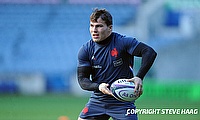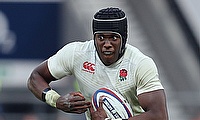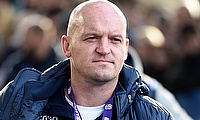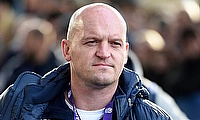Eddie Jones’ comments on private schools highlights ‘lack of knowledge’
Disappointing. Hurtful. Disgraceful.
These were just a few of the words Whitgift Director of Rugby Chris Wilkins used to describe Eddie Jones’ most recent outburst after he claimed English Rugby should “blow up” its public school system if they are to improve the quality of the players coming through the pathway.
Wilkins has been with Whitgift for 16 years, an independent school which has produced the likes of England internationals Elliot Daly, Marland Yarde and Harry Williams as well as Danny Cipriani.
Jones’ disrespectful comments have caused an immense backlash. Stating that players who have been privately educated live a “closeted life” and lack “resolve” to become leaders on the field has certainly bemused Wilkins.
Wilkins told TRU: “For an England coach to be speaking like that about any kind of school is very disappointing from my point of view. I think the biggest thing is, as a nation, we all need to work together.
“Any school, state, private, independent, universities, clubs, academies, we all need to be working together for the good of the English team. The England coach and the RFU should be actively encouraging that in my opinion.
“The big thing for me is there are so many good schools, state and independent, where the teachers and the coaches put in so much time across so many teams to develop players at all levels to inspire them to enjoy the game. People have given up so much time to do that so to be criticised and to have an England coach saying that is hurtful.”
Eight of England’s starting XV against Australia in their final Test of the summer were privately educated, while the next emerging talent – Henry Arundell – is part of the Harrow alumni, a school which Jones referenced in the interview with The i.
The RFU confirmed CEO Bill Sweeney had spoken to Jones about his comments and the governing body reiterated the value of independent schools when it comes to producing players. However, Wilkins believes the Australian’s remarks show a "lack of knowledge” about the landscape further down the rugby pyramid.
“There are a number of things that I think can be improved very quickly,” Wilkins adds. “I have always said, we can improve development through everyone working together because certainly from a schools perspective, we have not been communicated with as much as we have been in the past with the pathway system.
“I think it is then disgraceful when you have got the head coach of England talking about a section of the game where it is incredibly hard to develop players of all levels.
“Not only do these schools work to inspire students, we, for example, also work very closely with state schools to help develop their programmes and to help give them fixtures across the age groups in order to improve. It just shows a lack of knowledge of the English game [from Jones] in my opinion.”
Wilkins touches on the relationships Whitgift continues to have with state schools and with the help of new rugby development officer Sam Morley - who is a former pupil and an ex-England U20 international - he believes it is an aspect of school rugby which is evolving.
“To be honest, I know that we and so many other schools across all areas are doing some really good stuff and there is a lot of very good coaches and very hard-working coaches through junior clubs, state schools, public schools, private schools,” says Wilkins.
“I don't need to have someone like Eddie Jones telling us what we should be doing here. We know we're working hard, we are doing our best to develop our players and develop ourselves, and we will always do that.
“Over the years, we have always had lots of fixtures in midweek at different levels. For example, a number of schools may have just started their programme and ask us if we want to play them and it is a yes. Where we are very fortunate is we have 28 teams so we can play a 'B' or 'C' team against another school on a games afternoon and it just helps with that overall development.”
As well as his role at Whitgift, Wilkins is also head coach at National One outfit Esher and he also worked with the England Counties set-up before it became dormant following funding cuts made by the RFU as a result of Covid-19.
Wilkins’ experiences leave him well placed to comment on the development of players at all different levels who come from all different backgrounds. He feels this is most noticeable in the National League Rugby sphere.
“There is a very big cross-section of players in National League Rugby and I think the community game and the grassroots game is hugely important,” Wilkins adds.
“National One level and below, there is a very good standard of players and there is not much difference between some of those players and some professional players other than the fact they have got jobs and the strength and conditioning won't be the same.
“A lot of those players are teachers at schools, whether that be state or private, and they help develop and inspire the youngsters so I think he [Jones] has got to be very careful because I think the whole of the English game is more important than one person.”
Bringing it back to Whitgift and Jones’ comments about the public school system not producing resilient players, Wilkins says it ‘beggars belief’ and adds his school nurtures talent by challenging them regularly to help their students problem solve and develop.
“The biggest thing we, and I know many schools try to do, is to get a tough fixture list for the boys so they learn from tough experiences.
“We open our season with Sedbergh, then the next week we play Wellington, then the next week we play Harrow. They are very, very tough games so we are certainly not looking to just close ourselves off and just win easily. Players will learn to show some resolve.
“They will make mistakes because of the challenge and pressure and that helps with development both on and off the pitch. You then learn from it for the next time you are in that situation so when Eddie Jones says things like he has done, it says to me he has hardly watched any of the games [at that level.] It seems like a pre-conceived opinion.”
Once Jones leaves his post as England head coach after next year’s World Cup, Wilkins believes it will be a blessing because he feels English rugby needs to properly pull together if the game is to truly grow and move forward.
“I have got my thoughts on him [Jones] and to be fair, I think when we have a new structure next year, I think it will be good for the England team and the whole of the English game,” he says.
“You have got to coach the team well, you have got to select the team well, you have got to inspire a nation, and you have got to get everyone working together. I think if we could get all sections of the game working together, all for the good of English rugby, then I think there is huge potential.”








.jpg)